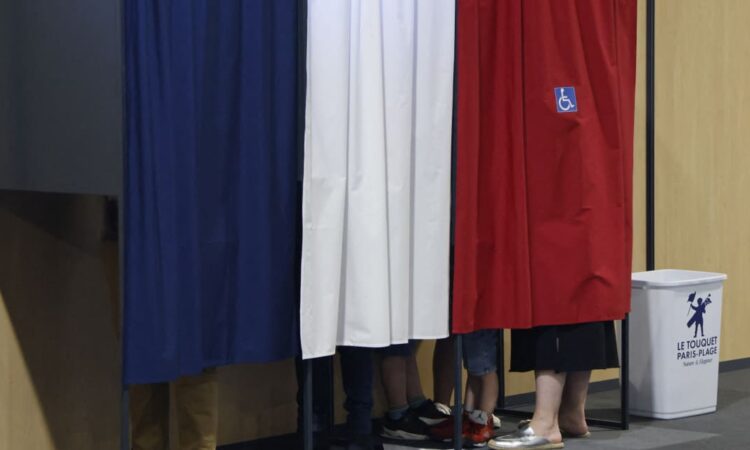
About the author: Patti Domm is an Emmy Award-winning financial journalist.
No matter the outcome of upcoming European elections, the immediate winner could be the U.S. dollar.
There have already been market tremors around the upcoming two-round French parliamentary elections June 30 and July 7. Strategists expect more, especially if the voting ends in a hung government with no clear party in control.
Major market dislocations are not expected, but the ripple effect could rattle French bond and stock investors as the French seat a government. That could also create a temporary flight-to-safety into U.S. Treasuries and drive more dollar strength against the euro, already at its weakest since April.
There is also a parliamentary election July 4 in the U.K., where the Labour Party looks set to oust Conservative Party rule for the first time in more than a decade. That election has had less market impact so far, and Labour is expected to rule more from the center fiscally. BlackRock expects that regardless of which party wins, the outcome could be a more focused approach to dealing with the U.K.’s structural economic issues.
Advertisement – Scroll to Continue
France’s election is expected to be more disruptive. French President Emmanuel Macron called for the snap elections after his party fared poorly in European Union parliamentary elections earlier this month.
Polls show the Rassemblement National, the far-right party of Marine Le Pen that bested Macron’s centrist Ensemble alliance, is leading in the polls. It is followed by the left-leaning Nouveau Front Populaire, with Macron’s party trailing in third place.
Europeans are concerned with some of the same issues that are driving U.S. politics, including the rising cost of living and immigration. But the French election also has bigger implications for the euro zone and could leave Macron a president without much support as he deals with foreign policy and other matters of state until his term expires in 2027.
Advertisement – Scroll to Continue
Some strategists liken the rise by the French right to that in Italy. There, Prime Minister Giorgia Meloni veered to the center, but it remains to be seen whether France’s RN will follow.
The market is not showing fear of euro zone-wide contagion, or worries that there could be a French “Frexit” from the euro zone. Le Pen’s RN no longer wants to leave the euro zone. However, whichever group gains control will need to show markets that it is serious about controlling spending and deficits.
“Meloni won and she governed responsibly. She’s been pro-EU, pro-NATO, anti-Russia and pro-aid to Ukraine,” said Marc Chandler, chief market strategist at Bannockburn Global Forex. “Le Pen represents the other side of the right in Europe, which is hostile to the EU and hostile to NATO.”
Advertisement – Scroll to Continue
Chandler said the election outcome could cause more upside for the dollar against the euro. He said the euro is now its most undervalued against the dollar since the Plaza Accord in 1985, when major countries joined to intervene against the dollar. The single currency did not then exist.
The euro was at $1.07 against the dollar Thursday.
Interest rate differentials and a weak European economic backdrop have fanned the current weakness. “Economics was the driver until the EU election, and even the market could take that,” said Chandler. “But the French call for the snap election seemed to take the legs out of the euro.”
Advertisement – Scroll to Continue
French bond yields also widened significantly against the German bund, and have narrowed just slightly since.
France’s issues are far less severe than the crises that plagued Greece and others in 2010. But S&P Ratings downgraded French debt on May 31.
RN leader Jordan Bardella has pledged his party will back “reasonable” spending plans and reduce the deficit to the 3% of GDP by 2027, the target established by the European Union.
Advertisement – Scroll to Continue
But the issue will be whether they appease voters who became disillusioned with Macron’s reforms, including an increase in the retirement age from 62 to 64.
Paul Christopher, head of global market strategy at the Wells Fargo Investment Institute, said France’s right won’t be able to deliver on its promises and will have to choose whether to move to the center, especially if it wants to hold onto power.
“They can’t give their supporters a younger retirement age. They can’t really increase the pension benefits and they can’t really lower taxes and still meet the EU budget guidelines,” he said. “They’re going to have to choose, and if they choose their supporters so they can stay in power through the next election then they’re not really going to be able to capture the presidency probably.”
Christopher said with all the focus on France, it may be the U.K. election that surprises markets. “It seems to be discounted. If you look at sterling versus the euro, it’s powering ahead,” he said.
“I think it’s less clear in the U.K. how a Labour government would work than it would be in France to see Le Pen and how her party would work,” he said.
BlackRock says the U.K. election could be followed by a positive bond market move.
“Beyond potential policy changes, a July election could allow the Bank of England to start cutting rates once it’s over—a reason why we like U.K. bonds,” BlackRock says.
Regardless of the outcome, these elections are an opening act to the U.S. election, which is surrounded by major uncertainty but does not seem to be impacting the markets yet. The dollar could be a leading indicator here too. Christopher says if former President Donald Trump were to return to the White House, the dollar could react to the idea of more tariffs. That could drive it even higher.
Guest commentaries like this one are written by authors outside the Barron’s and MarketWatch newsroom. They reflect the perspective and opinions of the authors. Submit commentary proposals and other feedback to ideas@barrons.com.






